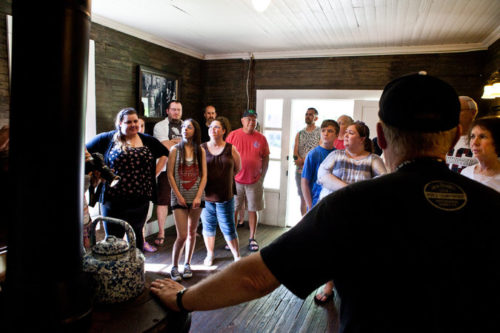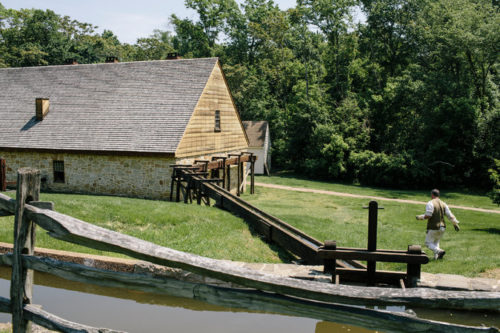Jack Daniel’s Embraces a Hidden Ingredient: Help From a Slave
Share
Explore Our Galleries
Breaking News!
Today's news and culture by Black and other reporters in the Black and mainstream media.
Ways to Support ABHM?
By

Visitors to the Jack Daniel’s distillery. Only recently has the company begun to embrace the story of Nearis Green, the enslaved man from whom Daniel learned to make his great whiskey. Credit Nathan Morgan for The New York Times
LYNCHBURG, Tenn. — Every year, about 275,000 people tour the Jack Daniel’s distillery here, and as they stroll through its brick buildings nestled in a tree-shaded hollow, they hear a story like this: Sometime in the 1850s, when Daniel was a boy, he went to work for a preacher, grocer and distiller named Dan Call. The preacher was a busy man, and when he saw promise in young Jack, he taught him how to run his whiskey still — and the rest is history.
This year is the 150th anniversary of Jack Daniel’s, and the distillery, home to one of the world’s best-selling whiskeys, is using the occasion to tell a different, more complicated tale. Daniel, the company now says, didn’t learn distilling from Dan Call, but from a man named Nearis Green — one of Call’s slaves.
This version of the story was never a secret, but it is one that the distillery has only recently begun to embrace, tentatively, in some of its tours, and in a social media and marketing campaign this summer.
“It’s taken something like the anniversary for us to start to talk about ourselves,” said Nelson Eddy, Jack Daniel’s in-house historian.
Frontier history is a gauzy and unreliable pursuit, and Nearis Green’s story — built on oral history and the thinnest of archival trails — may never be definitively proved. Still, the decision to tell it resonates far beyond this small city.

A man believed to be the son of Nearis Green sits at the right hand of Jack Daniel (center, in white hat). This photo, in Daniel’s old office,was taken at his distillery in Tennessee in the late 1800s. It was highly unusual for an enslaved worker to be photographed, especially alongside his owner and white paid employees.
For years, the prevailing history of American whiskey has been framed as a lily-white affair, centered on German and Scots-Irish settlers who distilled their surplus grains into whiskey and sent it to far-off markets, eventually creating a $2.9 billion industry and a product equally beloved by Kentucky colonels and Brooklyn hipsters.
Some also see the move as a savvy marketing tactic. “When you look at the history of Jack Daniel’s, it’s gotten glossier over the years,” said Peter Krass, the author of “Blood and Whiskey: The Life and Times of Jack Daniel.” “In the 1980s, they aimed at yuppies. I could see them taking it to the next level, to millennials, who dig social justice issues.”
Jack Daniel’s says it simply wants to set the record straight. The Green story has been known to historians and locals for decades, even as the distillery officially ignored it.
Left out of that account were men like Nearis Green. Slavery and whiskey, far from being two separate strands of Southern history, were inextricably entwined. Enslaved men not only made up the bulk of the distilling labor force, but they often played crucial skilled roles in the whiskey-making process. In the same way that white cookbook authors often appropriated recipes from their black cooks, white distillery owners took credit for the whiskey.

President George Washington relied on six slaves to help run his rye whiskey distillery, one of the largest on the East Coast. This is a re-creation of the grist mill and distillery at Mount Vernon, Washington’s home in Virginia. Credit: Lexey Swall for The New York Times
In deciding to talk about Green, Jack Daniel’s may be hoping to get ahead of a collision between the growing popularity of American whiskey among younger drinkers and a heightened awareness of the hidden racial politics behind America’s culinary heritage....
A business built on slave help may not seem like a selling point, which may explain why Jack Daniel’s is taking things slowly. The Green story is an optional part of the distillery tour, left to the tour guide’s discretion, and the company is still considering whether it will flesh out the story in new displays at its visitors center.
However far the distillery decides to go, it is placing itself at the center of a larger issue that distillers and whiskey historians have begun to grapple with only in the last few years: the deep ties between slavery and whiskey.
Read the full article here.
More Breaking News here.









Comments Are Welcome
Note: We moderate submissions in order to create a space for meaningful dialogue, a space where museum visitors – adults and youth –– can exchange informed, thoughtful, and relevant comments that add value to our exhibits.
Racial slurs, personal attacks, obscenity, profanity, and SHOUTING do not meet the above standard. Such comments are posted in the exhibit Hateful Speech. Commercial promotions, impersonations, and incoherent comments likewise fail to meet our goals, so will not be posted. Submissions longer than 120 words will be shortened.
See our full Comments Policy here.